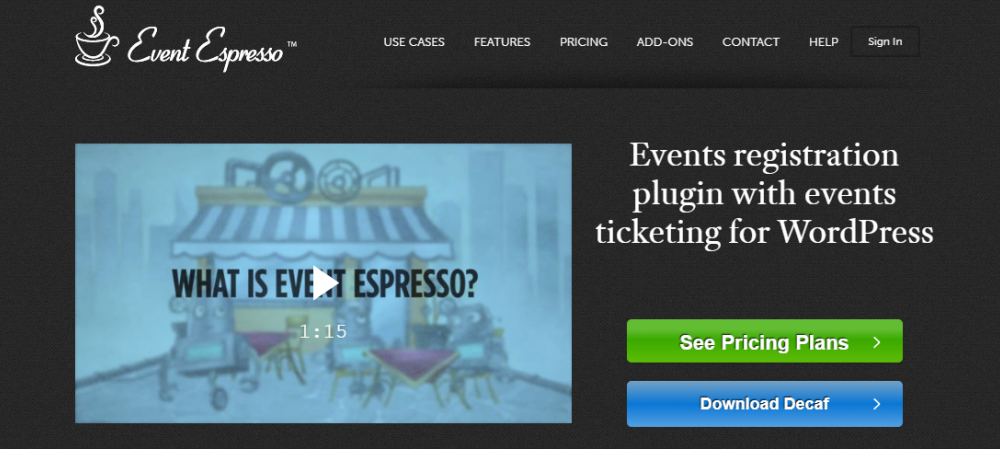
As an event organizer, finding open source event management software can be difficult. There are many tools out there – each offering a wide array of features.
In this article, we’ll look at some of the most important features you should consider when choosing an open source event management software. But first, let’s take a look at what open source event management software is and the key benefits of using it.
What Is Open Source Event Management Software?
As an event organizer, one of the first decisions you’ll have to make is whether to use open source event management software or go for a hosted solution. Let’s quickly go over what open source event management software is and how it differs from a hosted solution.
Open Source Event Management Software
For those unfamiliar, open source software is software that’s distributed under a licensing agreement with source code that anyone can view, modify, and share. When you go for open source event management software, you have the option to customize its core event management functionality to fit your specific needs.

Event Espresso is an example of open source event management software.
Hosted Event Management Solutions
Hosted software is software that is installed, hosted, and made accessible to users through a remote server. It’s hosted and managed by the service provider, software manufacturer, or third-party vendor. Many times, hosted software is referred to as closed source software or software as a service (SaaS).
Hosted event management solutions pack a number of tools out of the box that will help you plan and organize an event. These tools are designed to automate various pre-event, during event, and post-event tasks. Most hosted event solutions also offer features to help you promote your events.

Eventbrite is an example of hosted event management software.
It’s also worth mentioning here that some hosted solutions are built on top of open source technology. For example, Event Smart is a hosted event management solution that’s built using Event Espresso and WordPress.
Examples of Open Source Event Management Software
Some of the most popular open source event management software include:
- Event Espresso. This WordPress plugin gives you tools to organize any type of event, accept online registrations, and design and sell customized tickets. Event Espresso lets you create custom registration forms, offer discounts, set multiple price options, offer printable tickets, manage attendees, and much more.
- 123FormBuilder. 123FormBuilder’s open source version lets you create registration forms for your events with a limit on the number of fields you can add to your forms and the number of forms you can send each month. It supports integration with popular publishing platforms like WordPress, Facebook, and Twitter.
- Evite. Evite’s open source event management software lets you send out hundreds of invitations to your customers. You can choose from a large number of pre-designed templates or customize your email invitations.
- OSEM: Open Source Event Manager. OSEM lets you create a website for your event with the option to add event information. You’re able to track attendee registration and let attendees submit proposals through your event website.
Now that we have a better understanding of how open source event management software differs from hosted solutions, let’s look at some of the key benefits of using open source event management software to plan and organize events.
Benefits of Using Open Source Event Management Software
There are a number of key benefits of using open source event management software versus a hosted solution to plan and organize your events. Most importantly, you’ll notice a difference in terms of cost, security, and flexibility.

Cost
Open source software is available under a licensing agreement to be viewed, used, modified, and distributed by individual and organizations. Unlike hosted solutions, you won’t be charged a monthly fee to use open source software.
Open source software users don’t need to worry about the software manufacturer jacking up its price whenever they want. Hosted event management software companies (such as Eventbrite), have been known to increase their ticket fees.
However, it’s worth noting that open source software does require proper maintenance and regular upkeep.
As an event organizer, going with an open source event management software gives you a free alternative to expensive (and, potentially, business-threatening) hosted event management solutions.
Security
Open source software has a large community of developers that regularly test the software and provide technical support in forums. As a result, any potential bugs in the software are exposed and fixed before they can do damage. In addition to this, open source software users share their experiences and make customized versions of the software available online for other users to benefit from.
If hosted event management software crashes, you’d have to wait for the platform’s developers to fix the problem. However, if you come across a problem with open source software, you can quickly find help online.
With open source event management software, you can rest assured that your sales data and registrations are fully secure. You host the software on your own website and, therefore, have full control over it.
Freedom and Flexibility
Hosted solutions only give the user the right to use the software and not the ability to modify its code to their specific needs.
Most hosted event management solutions will tell you that their software will fit your unique requirements. However, as your business grows, you’ll likely need to fork out more money for a higher tier plan.
Open source event management software offers more freedom and flexibility than a hosted solution.
Compared to hosted software, open source event management software comes with source code. This means that you can not only use the software but also modify and extend it’s source code to fit your specific needs.
Using open source event management software clearly has its benefits. So, let’s look at some of the key features you should look for in open source event management software.
8 Features to Look for in Open Source Event Management Software

When you go looking for open source event management software, you might be overwhelmed with the sheer number of options that are available to you. So, how do you know which tool is right for your event management needs?
Here are some of the key features you should look for in open source event management software:
#1: Online Event Registration and Ticketing
As an event organizer, you need to be able to offer online registration and ticketing options to prospective attendees. This way, you’ll be able to get more people to attend your events and deliver good experience to attendees.
For this reason, your open source event management software needs to offer powerful online event registration and ticketing functionality. You’ll be able to create custom registration forms, design tickets, set ticket prices, and sell tickets directly through your event website (more on that later).
The best part is that you can automate your entire event registration process. Instead of having to manually fill out paper registration forms, the software will automatically ask attendees for their information and register them for your event.
Event Espresso is open source event management software that lets you create conversion-optimized forms from within your WordPress website. In addition to this, the software makes it easy for attendees to submit group registrations. You can also create as many types of tickets as you’d like and set multiple pricing options.
#2: Collecting Payments
Offering multiple payment gateways to prospective attendees can go a long way in improving your event’s conversion rate. Which is why one of the features to look for in open source event management software is the number of payment gateways it supports out of the box.
The more payment gateways you can offer, the easier it will be for attendees to buy tickets.
We recommend using an open source event management software that lets attendees buy tickets online and on-site at the day of the event.
Event Espresso offers six different built-in payment gateways with the option to integrate 17 more payment gateways that are available as paid add-ons. The software gives registrants the option to enable multiple gateways at a time and receive payments made through PayPal, credit cards, or an offline method.
#3: Attendee Management
Building strong relationships with attendees is key to organizing successful events. Good open source event management software allows you to gather feedback from your event’s participants. You can use this information to plan better events in the future.
Having an open communication channel lets you communicate directly with both past attendees and prospective attendees and helps you build relationships. Armed with the knowledge of what attendees want, you’ll be in a better position to plan events that deliver value. This will ultimately help you boost ticket sales.
With Event Espresso’s attendee manager, you’re able to quickly compile attendees’ registration information and payment status and export it to generate reports. In addition to this, you can communicate with them individually or as a group. It even lets you send payment receipts and reminders to selected registrants.
#4: Event Marketing
Event management software with built-in marketing tools can help you increase conversion rates and boost ticket sales. For instance, you might consider offering special discounts to repeat attendees or incentivize attendees to purchase multiple tickets for a progressively lower per ticket price.
Similarly, open source event management software with social media integration make it easy for event attendees to recommend your events to their friends on social media platforms like Twitter and Facebook.
Event Espresso gives you several marketing tools to improve your ticket sales. You can offer promotional codes to prospective attendees improve your chances of converting them into buying customers. It also lets you add social media buttons to your website so your registrants can share your event’s details with their friends.
On top of this, Event Espresso’s MailChimp Integration (available as a paid add-on) automatically adds registrants’ email addresses to your MailChimp mailing list which helps you grow your marketing email list on autopilot.
Be sure to check out this article on 7 Ways to Upsell Event Registrations and Tickets with Event Espresso for event marketing strategies!
#5: Reporting and Analytics
Your open source event management software should offer functionality to help you track and analyze attendees’ data. This will let you track key event marketing metrics and gauge the success of your events.
Here are some of the reporting and analytics features on offer with Event Espresso:
- Transaction Reporting. With Event Espresso, you’re able to generate lists that automatically display details of attendees who have checked into an event. It also lets you keep track the number of registrations and amount of revenue you’ve generated.
- Registration Trends. Event Espresso offers tools to automatically collect attendee information, track registrations, and receive payments. It also allows you to use affiliate and referral links (available as a paid add-on) to boost your event registrations.
- Cost per Attendee. With Event Espresso, you’re able to quickly calculate your event’s ROI by exporting data (like transaction amount, attendance, payment gateways, etc…) directly into CSV or Excel format.
#6: Support
Although open source software is generally supported by the entire community that uses it, you should see if the software you’re considering has a dedicated support channel. At the very least, forum support is available with most open source event management software.
Event Espresso is a fully supported open source event management software that offers multiple support channels. Event organizers are able to get in touch with the software development team via support tokens, community chat, forums, and a dedicated Slack channel. All of these support channels can be accessed directly through the Event Espresso website.
In addition to this, the open source software also has a knowledge base and documentation published on the website for DIYers.
#7: Ongoing Development
Another important factor you need to consider before settling on an open source event management software is software stability. A short history of development often indicates that the software is still under development or that the first version of the software has been released to find co-developers.
The great thing about Event Espresso is that it has been around for almost ten years. It has a dedicated Developer Portal. that offers resources for developers contributing to Event Espresso or those who are building themes and plugins for the Event Espresso platform.
#8: Customize and Extend
Open source software gives you options to customize and modify its source code to your specific needs. This is important because, as your business grows, you’ll need access to advanced features and functionality.
For instance, you might need to integrate with APIs or have a developer add custom functionality to it that streamlines your specific business processes. So, the open source event management software you decide to go for should let you extend its core functionality.
With Event Espresso, you’re able to build upon it using APIs, integrations, and custom code. The software has a number of paid add-ons that you can integrate with your Event Espresso-based website to get access to advanced features such as additional payment gateways, barcode scanner, events calendar, marketing features, and much more.
In addition to this, you can hire WordPress developers who have experience with Event Espresso to help you add custom features to your event website.
Conclusion
Hopefully, by now you have clear understanding of what features to look for in open source event management software. The solution you choose will ultimately depend on your own specific requirements and how much flexibility and control you want over your events.
As compared to a hosted solution, open source event management software will always give you more control, more freedom and flexibility, and better support at virtually no cost. And the best part is that you’re free to extend and modify the software as your business grows.
Between open source event management software and a hosted solution, which option are you leaning towards and why? Let us know by commenting below.

